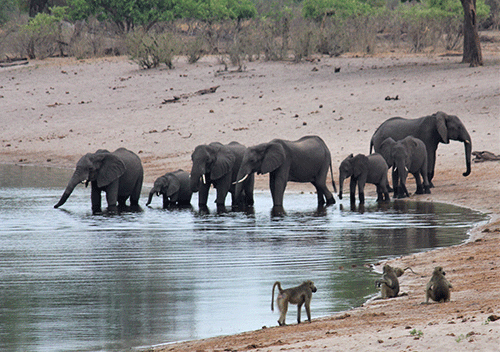Community conservation leaders from four Southern African countries in the Kavango Zambezi Transfrontier Conservation Area are up in arms because the UK government intends to prohibit the import of wildlife trophies by means of legislation.
The conservationists believe the UK has no record of wildlife conservation and should not prescribe to African countries how to manage theirs.
The British government early this month announced plans to ban the importing of hunting trophies, as part of a conservation initiative to protect endangered animals through the Hunting Trophies (Import Prohibition) Bill.
Dubbed Sally’s Law, in honour of a tiger cub who was ‘rescued’, aims to ban British trophy hunters from bringing home the trophies from hunting trips. It will go to the British parliament on 17 March 2023.
Angered and puzzled by the news of this Bill, the Namibian Chamber of Environment, an umbrella organisation for 70 environmental non-governmental organizations (NGOs) was requested by the delegation of community conservation leaders from four Southern African countries who attended a meeting in the Kavango Zambezi Transfrontier Conservation Area (KAZA TFCA) to produce a response to such effect.
KAZA covers 520 000km² of Angola, Botswana, Namibia and Zambia. It is more than double the size of the United Kingdom and encompasses 20 national parks, 85 forest reserves, 22 conservancies, 11 sanctuaries, 103 wildlife management areas and 11 game management areas.
A taskforce then wrote a joint statement to the British parliament, and to the ambassadors or high commissioners in the four countries to the news that the UK government intends to prohibit the import of wildlife trophies into that country by means of legislation.
The problem statement was unanimously adopted by 107 delegates, the majority of who come from the communities they represent in the four countries – Angola, Botswana, Namibia, and Zambia.
They asked the British MPs to send a delegation to the four countries to meet the rural communities that benefit from hunting income and who are directly engaged in community-based conservation.
The leaders argued wildlife and its wise management is part of the economy of Southern Africa.
“Trophy hunting is an important part of that economy. This view is shared by rural communities, environmental NGOs, and governments. There is thus a significant difference between the views on trophy hunting held by environmental NGOs in your country and those in Southern Africa. And that is explained by the fact that we have seen firsthand, how well-managed hunting contributes to conservation and to rural livelihoods,” contended the Namibian Chamber of Environment CEO, Chris Brown. He said this can also be clearly seen in the macro-environmental indicators of wildlife numbers and trends in Southern Africa, further supported by a peer-reviewed study of 152 countries and their success in conserving the world’s megafauna.
Botswana and Namibia were rated the most successful, Zimbabwe was fifth, Zambia ninth, and Angola, after decades of civil war, 40th.
“The UK was 123rd. It is thus somewhat paradoxical that the UK feels it is necessary to impose its conservation approach on countries with far more successful conservation track records. I think that it is also worth drawing to your attention the fact that Southern African countries are becoming increasingly sensitive to the attempts by western industrialised countries to dictate how they use and manage their natural resources, especially given the above ratings,” charged Brown.
The rural communities have challenged the British government via their high commissioners and ambassadors to visit their communities, wildlife areas, and programmes and see for themselves what is happening.
He assured the British government that it will highly be impressed and take home a totally different understanding of the situation, adding their current views are understandably influenced by the loud voices of NGOs and animal rights advocates. He lashed out at these animal critics saying they do not live with difficult and dangerous megafauna.
Hence they do not need to come up with conservation policies and approaches to maintain wildlife outside of national parks.
“Just think for a moment how your farmers would respond if you still had wolves, bears, and lynx roaming freely across your country. They would simply not tolerate them unless they got some significant and tangible benefits. And your UK extinct species are far less problematic than elephants, hippos, lions, hyenas, crocodiles, and the many other species that our farmers need to contend with. Your proposed Bill will remove the benefits our farmers get, and they too will then not tolerate these species on their farmland,” he simulated.
Conservation leaders are hopeful that the UK government will give deep thought to these issues as conservation in Southern African countries will be very negatively impacted by the proposed Bill.
–anakale@nepc.com.na



